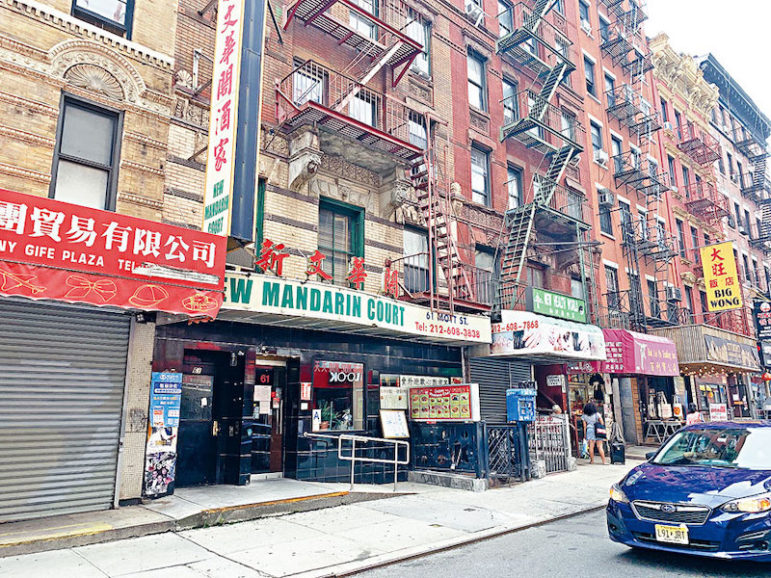‘Eateries like Golden Mandarin Court, Amazing 66 and Hop Shing are shuttering after months of quarantine restrictions and decreased tourism in Chinatown. ‘It’s been four months now. It’s not getting any better,’ one owner said.’

Read the original story in Chinese at Sing Tao Daily
Translated and condensed by Rong Xiaoqing
While many restaurants are struggling with the ongoing inability to fully reopen, several long time eateries in Chinatown recently decided to shut their doors for good. The owners of these restaurants — including the Golden Mandarin Court, Amazing 66 and Hop Shing — says the pandemic not only ravaged their businesses, but brought down their hope for the future.
“We are closing for good,” says Helen Ng, owner of Amazing 66, as she looked at the brand new sign board on her restaurant, unwilling to take it down. The restaurant has been operating in Chinatown for 14 years, and after a renovation last August, Ng hired back its reputable original chef.
“The business was picking up. And, then, the pandemic came,” she says.
Ng says the restaurant closed temporarily on March 15 to cope with the pandemic.
“But it’s been four months now. It’s not getting any better,” she says, adding that the street space in front of the restaurant is not broad enough to place outdoor tables, and that their business relied on family gatherings.
“No visitors or tourists come to Chinatown now. I think the business won’t recover at least for half a year or a year. So we decided to give up.”
Shirley Lo, owner of the Golden Mandarin Court, made the same tough decision.
“It is so difficult to maintain the business now,” Lo says. “You have to keep paying the high rent, and there is no business.”
Despite the restaurant having temporarily closed for four months, the landlord still asks her to pay all the cleaning and utility costs.
“This is so unreasonable,” she says.
Lo says she had some regular patrons, and the eatery attracts first-time tourists too. But the former customers now don’t dine out as often due to fear of the virus, and the latter no longer come to Chinatown. “I don’t know when the business can turn around.”
Mrs. Zhu, owner of the New Shanghai Deluxe, says the restaurant has pulled in limited revenue each day despite having opened outdoor dining.
“The number of our customers is only about 10 to 20 percent of that before the pandemic,” says Zhu. “The more we work, the more we lose.”
Zhu says many restaurants in Chinatown rely on group banquets of community organizations for business, groups which have largely ceased activities. Chinatown is now quiet and empty by 6 or 7 p.m.
Many restaurants have to pay tens of thousands of dollars in rent, and it is hard for them to hire back employees who would rather stay safe and live on unemployment benefits.
“Maybe we’ll have to close too,” Zhu says.
Wellington Chen, executive director of the Chinatown Business Improvement District (BID), conducted a survey in June and found that 175 among the 291 restaurants and snack shops in its jurisdiction were open, compared to only 39 in April.
But Chen says the reduced number of visitors is a major hindrance for Chinatown restaurants to recover from. Unlike other Chinese neighborhoods such as Flushing or Sunset Park, where there are hundreds of thousands of regular residents who are able to support local businesses, the Chinatown area only has about 40,000 residents. It’s economy is largely based around the 66 million tourists who visit New York each year, few of whom are visiting now. Daily subway ridership has also dropped to from 5.5 to 1.2 million.
“How do the shops survive when the number of visitors drop so much?” Chen says.
The BID provided grants to the 39 restaurants that first opened in April to help them survive, and also donated some umbrellas for outdoor dining areas. The Chinese Consolidated Benevolent Association (CCBA) is also working with the city to make Bayard and Pell streets into pedestrian-only streets on the weekends so restaurants can use them for dining.
Justin Yu, president of the CCBA, says that if the plan works well, it may expand to the entirety of Chinatown.
While some people worry that pedestrian-only streets would squeeze out the already precious parking space in Chinatown, Yu says the CCBA plans to talk with nearby garages to see whether they can provide discount parking on weekends.
He also calls for the city to reduce property taxes for landlords.
“Once the landlords are not under the pressure of property tax, they are able to provide rent relief for their tenants,” Yu says.
Chen says he doesn’t believe parking would be made worse by pedestrian-only streets, but says the city can help alleviate any issues by regulating how its public employees drive and park. He says previous studies by the Chinatown Partnership, the organization that runs the BID, found more than 700 parking spots around Chinatown are typically taken by city employees with parking placards in mid-August, when schools are not in session.
“I suggested to the city before that it should require employees to take public transportation one or two days per week. If the city can do that, Chinatown won’t have to worry about parking space anymore,” Chen says.
Zhilian Mo, manager of the 46 Mott Bakery says he supports making Chinatown streets pedestrian-only on weekends.
“Chinatown is crammed and the space for outdoor dining is limited,” says Mo. “Pedestrian streets would make outdoor dining safer and reduce dust stirred up by cars.”
As for parking, Mo says he isn’t worried.
“Chinatown has no visitors and no business. It doesn’t have much to lose now. We have to try all means in order to survive.”










5 thoughts on “Longtime Chinatown Restaurants Close for Good Amid Pandemic”
Chinatown is a very important part of New York, I have been going to Chinatown since I was a little girl. And, to be honest it’s the best food in all of NYC. The City should be able to help Chinatown get back on their feet. And the people that live in the neighborhood, even if you can’t sit inside the restaurant, you can do take out. And yes, Landlords should be given a break so they in turn give their tenants a break.
Great article. I lived in Chinatown for a couple of decades, I now live in uptown, but I visit and shop in Chinatown every week. Chinatown couldn’t compared to the early days like the 60s, 70s, 80s or the 90s when Chinatown was the mecca of eatery and shopping for exotic food and things. Chinatown began to lose some of its vibrancy when other boroughs sprung up with their own Chinatown. Unfortunately, the only business that is really thriving today is the duplicate product business. But the virus has reduced Chinatown into a desert. I felt so empty and sad, my eyes are filled with tears when I travel to Chinatown, as if life ceased to exist. All lives has abandoned the once vibrant neighborhood. SAD!
Hip Shing was one of my favorite restaurants in Chinatown. I would get roast pork buns by the dozen. The rice noodle wrapped shrimp was one of my favs also. How could I forget the beef chow ho fun too. They had very expensive copper pans that would sear and lightly char the noodles… the best. Beef chow ho fun most other places is mush.
NY doesn’t have much to make me stay anymore. Way too many deals for the wealthy with this covid pandemic and nothing makes it down to working class. After I make my move out I may come back when NY is Republican again.
Why republican?
Our family is so disappointed that Amazing 66 is closed for good! It was our must stop Chinatown favorite in NYC! Awee! There’s nothing comparable we know to replace our table for eight! Found out today 3/14/21 they are no longer temporarily closed and stopped delivery for orders > $100..